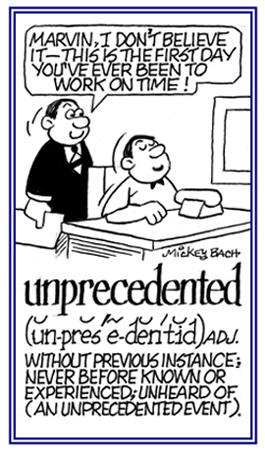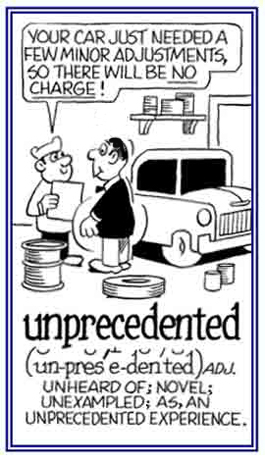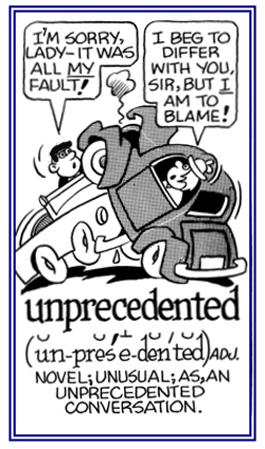pre-, prae-
(Latin: before [both in time and place])
The prefix prae- can actually be substituted for pre- because both of them are different spellings for the same prefix meaning "before".
2. A statement that someone makes which perverts or avoids the truth: Jimmy said he didn't break the neighbours window while playing ball, but it turned out that this was a prevarication, because he really did and lied to his parents about it!
3 Etymology: from about 1382, "divergence from a right course, transgression", from Old French prevaricacion, from Latin prævaricationem, "a stepping out of line (of duty or behavior)"; from prævaricatus, a form of prævaricari, "to make a sham accusation, to deviate"; literally, "to walk crookedly", from prae, "before" + varicare, "to straddle", from varicus "straddling", from varus, "bowlegged, knock-kneed".
2. Anyone who speaks so as to avoid the precise truth; a quibbler; an equivocator: A prevaricator originally meant a straddled or a bent-legged person with crooked legs or someone who, because of distorted legs, could not walk in a straight line; now, it is someone who purposely deviates or avoids speaking truthfully.
3. Etymology: from Latin praevaricator which came from prevaricatus; the past participle of the verb prevaricari, "to lie; literally, "to walk crookedly", as if "straddling something"; from prae, "before" + varicare, "to straddle, to walk crookedly".

Go to this Word A Day Revisited Index
so you can see more of Mickey Bach's cartoons.
2. Concerning something that produces a sense of anticipation; anticipatory: Prevenient excitement at the thought of the first day of vacation was certainly on Betty's mind when she was walking home from her last day of school.
2, To keep a person or something from being active in a certain way: The extreme weather conditions with storms and heavy rain prevented the airplane to take off on time.
Tom prevented his sister entering the bedroom by standing in her way, so she had to push him away!
Many car accidents are preventable by not drinking before driving a vehicle.
Preventative or precautionary measures should be taken in classrooms to keep the students safe during the Coronavirus pandemic.
Many people in Germany think that lowering speed limits on the freeways would be a precaution to forestall the number of tragic accidents that happen.
2. An advertisement consisting of short scenes from a motion picture before it appears in the near future, or to see parts of a play or exhibit before it is available to the general public: Mrs. Smart wanted to see the preview of the movie first before deciding if she really wanted to go.
3. An introductory or preliminary message, sample, or overview; a foretaste: In the newspaper there was a preview of the upcoming event of the famous author appearing at the local bookstore to present and sign his newest novel.
4. A piece printed in a paper or magazine or broadcast on radio or TV describing and commenting on something that is soon to be broadcast or presented to the public: The preview of the upcoming talk show to take place the next day was shown between the other commercials on Jane's television.
5. A sample or foretaste of something likely to occur in the future: The political polls could provide a preview of the actual election results.
2. To inspect something before it is implemented or available for public use: The teaching aids were previewed first by the teachers to make sure that they were applicable for specific purposes in the classroom.
2. Concerning a person who is unduly rash in coming to a conclusion: Mr. Timmons though that his student was a bit previous in answering the question.
2. Pertaining to how much earlier one event happened before another one: Jane said that she had bought the car one year previously.
2. To warn; to inform ahead of time: Dr. Smith prevised Jim of the dangers of drinking alcoholic beverages and smoking.
3. Etymology: from Latin praevisus, past participle of praevidere, "to foresee"; from pre-, "before" + videre, "to see".
2. Relating to something that has never been seen, done, or experienced before: The unprecedented decision that the Jackson family made was to go on vacation in the Alps, a place they had never visited previously.
3. Descriptive of the greatest in size, amount, degree, etc. that has ever been known: According to the news, the flood waters in some countries have risen to unprecedented levels.
4. Etymology: un-, "not" + precedent, "experienced" + -ed, "past tense".



Go to this Word A Day Revisited Index
so you can see more of Mickey Bach's cartoons.
Related before-word units: ante-; antero-; anti-; pro-.
Related "time" units: aevum, evum; archaeo-, archeo-; Calendars; chrono-; horo-; Quotes: Time; tempo-.

